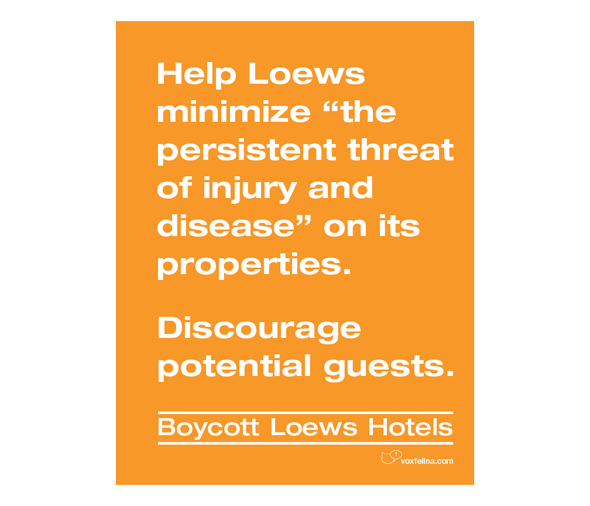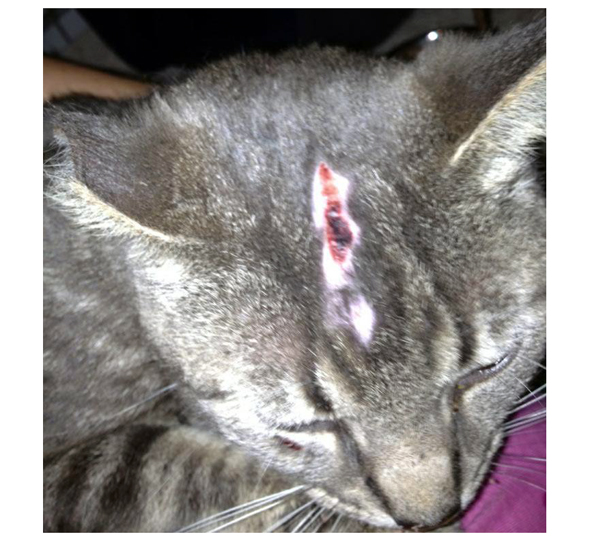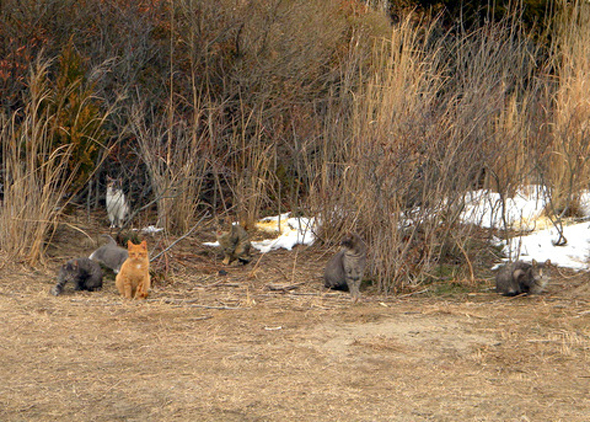
For those of you not following the Loews Cats story on the Vox Felina Facebook page, here’s a quick update…
For more than a week now, cats have been trapped at both the Portofino Bay Hotel and Royal Pacific Resort properties. From what I can tell, all 10 that have been trapped have been taken to Orange County Animal Services, where they are subsequently bailed out by volunteers for CARE Feline TNR, Inc., the same organization responsible for the sterilization, vaccination, and long-term care of the Loews cats. (This is done, as I understand it, in collaboration with Orange County Animal Services—OCAS provides the veterinary services, and CARE agrees to provide ongoing care.).
Six or seven cats (reports from caretakers have, understandably, not been entirely consistent) have yet to be trapped.
Frequent updates have provided all week on CARE’s Facebook page, as well as on the recently launched Save Loews Cats Facebook page (which has attracted 1,659 “Likes” in just eight days!).
Inexcusable Conditions
On Thursday, Alley Cat Allies co-founder and president Becky Robinson published a letter on the Care2 website in which she criticizes Critter Control, the pest control company hired by Loews, for “clearly not following humane best practices.”
“We have heard reports of cats being held in the traps outside for hours. The average temperature in Orlando in the past five days has been 89 degrees; today’s heat index is expected to be 97 degrees. There is no indication that proper protocol for trapped cats—visiting the traps every hour, keeping them covered with a towel to minimize the cats’ anxiety, and removing them promptly—is being followed.”
Indeed, an update (sent from one of the caretakers) posted Wednesday on the Save Loews Cats Facebook page reads: “Just reported that there is a cat in a trap at Royal Pacific howling and baking in the sun. Somebody please stop them!”
Later that same day, a photo of Shadow—an open gash on the top of her head—was posted on CARE’s Facebook page with a note reading: “Others have sustained injuries similar to this.”

Earlier this week, Alley Cat Allies started a petition “calling on Loews to stop trapping cats right now” and, according to one of CARE’s “Bailout Team Members,” also made a “generous donation toward the purchase of crates and relocation supplies so very much needed to move the Loews/Universal cats to a safe permanent location.”
No Viable Option?
For its part, Loews has been pretty quiet—hardly surprising, in light of the coverage the story has received, from the mainstream media to various online cat-friendly outlets, including CatChannel, Catster, and Petside.
On Friday, however, the luxury chain was responding to e-mail inquires this way:
Thank you for contacting us. We hear your concerns and understand there are many reports circulating of inhumane trapping. These are not accurate. We continue to re-locate feral cats to the Orange County Animal Services Center and are working closely with the team there. Everything is being handled with the utmost care by experts. Orange County Animal Services was on-site with us as recently as last night for a detailed review of everything we are doing and advised us that they had no concerns with our process.
To provide you with more background, please understand that we reviewed our practice involving feral, free-roaming cats and talked with numerous agencies, including Orange County Animal Services. We met with a local feral cat group to seek their assistance in the re-location, but they felt they could not support this change. For more than two months, we sought input from the public on a solution for re-locating the feral cats. No viable option emerged, after weeks of diligent outreach.
It is important to note that the Florida Department of Health states that feral cats pose a continuous concern to communities due to the persistent threat of injury and disease. The priority at our hotels is the health and safety of our guests and team members.
We would encourage you to review the Florida Department of Health’s Rabies Advisory Committee position statement on this issue. You may access it here:
http://www.doh.state.fl.us/Environment/medicine/rabies/Documents/RabiesGuide2011Binder.pdf
Page vii (near the bottom) and continuing on page viii.
Loews Hotels at Universal Orlando
Well, as always, I’m here to help. And the best way to do that—to prevent any Loews team member or guest from being exposed to rabies or, more broadly, “the persistent threat of injury and disease”—is to discourage people from going there.
Any empty resort is, as they say, a safe resort.
Please help spread the word!
• • •
CARE needs our help finding permanent homes for these cats. If you know anyone with a farm, barn, stable, etc. who might be interested, please email: caroln@carefelinetnr.org.





